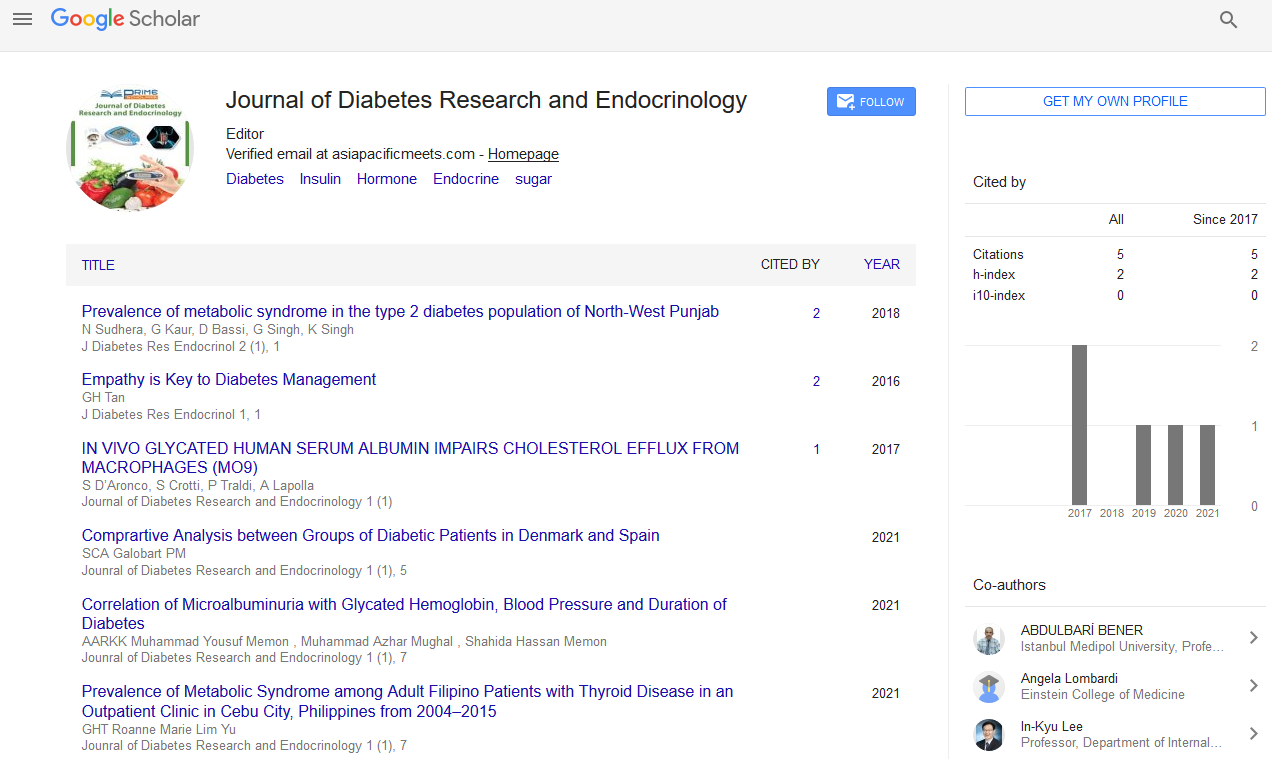Opinion - (2024) Volume 8, Issue 2
Postpartum Care and Long-Term Management After Gestational Diabetes
Dylan Harvey*
Department of Endocrinology, West of Scotland University, UK
*Correspondence:
Dylan Harvey,
Department of Endocrinology, West of Scotland University,
UK,
Email:
Received: 29-May-2024, Manuscript No. IPJDRE-24-20959;
Editor assigned: 31-May-2024, Pre QC No. IPJDRE-24-20959 (PQ);
Reviewed: 14-Jun-2024, QC No. IPJDRE-24-20959;
Revised: 19-Jun-2024, Manuscript No. IPJDRE-24-20959 (R);
Published:
26-Jun-2024, DOI: 10.36648/ipjdre.08.02.19
Introduction
Gestational diabetes is a temporary form of diabetes that
occurs during pregnancy and typically resolves after delivery.
However, women who have experienced gestational diabetes
are at an increased risk of developing Type 2 diabetes and other
metabolic disorders later in life. Proper postpartum care and
long-term management are crucial to mitigate these risks and
ensure the health and well-being of both the mother and the
baby. This article discusses the essential aspects of postpartum
care and long-term management after gestational diabetes.
After delivery, blood sugar levels usually return to normal,
but it’s essential to monitor them closely in the immediate
postpartum period. Women should continue checking their
blood glucose levels as advised by their healthcare provider to
ensure they stabilize. Six to twelve weeks postpartum, women
who had gestational diabetes should undergo a glucose
tolerance test to confirm that blood sugar levels have returned
to normal. This test helps identify any lingering glucose
intolerance and determines the need for further monitoring
or intervention. Breastfeeding is beneficial for both mother
and baby and can help regulate blood sugar levels. It promotes
weight loss, which is essential for reducing the risk of Type 2
diabetes. Additionally, breastfeeding provides vital nutrients
and antibodies to the baby, enhancing their overall health and
immunity.
Description
Regular follow-up appointments with healthcare providers are
crucial for monitoring blood sugar levels and overall health.
Women who had gestational diabetes should have their blood
sugar levels checked at least every three years to screen for
Type 2 diabetes and prediabetes. Maintaining a balanced and
nutritious diet is key to managing long-term health. A diet rich in
whole grains, lean proteins, healthy fats, fruits, and vegetables
can help regulate blood sugar levels and prevent weight gain.
Limiting the intake of refined sugars and carbohydrates is
essential to avoid spikes in blood glucose. Engaging in regular
physical activity helps improve insulin sensitivity, control
weight, and reduce the risk of developing Type 2 diabetes. Aim
for at least 150 minutes of moderate-intensity exercise, such as
brisk walking, swimming, or cycling, each week. Achieving and
maintaining a healthy weight is crucial for reducing the risk of
Type 2 diabetes. Postpartum weight loss should be gradual and
sustainable. Combining a healthy diet with regular exercise is
the most effective way to manage weight. Smoking increases
the risk of cardiovascular diseases and insulin resistance, while
excessive alcohol consumption can lead to weight gain and
negatively impact blood sugar levels. Avoiding smoking and
limiting alcohol intake are important steps in long-term health
management.
Conclusion
Providing information on healthy lifestyle choices, early warning
signs of diabetes, and the benefits of regular monitoring
empowers women to take charge of their health. Ensuring
access to healthcare resources, including nutritionists, diabetes
educators, and support groups, can help women effectively
manage their health. Providing resources for affordable
healthcare and regular screenings is essential for long-term
management. Postpartum care and long-term management
after gestational diabetes are critical for reducing the risk of
Type 2 diabetes and other health complications. Through
regular medical check-ups, a healthy diet, regular physical
activity, weight management, and psychological support,
women can effectively manage their health and ensure the wellbeing
of themselves and their families. Empowering women
with knowledge and resources is key to successful long-term
management and prevention of future health issues. With the
right strategies and support, women who have experienced
gestational diabetes can lead healthy and fulfilling lives.
Citation: Harvey D (2024) Postpartum Care and long-term Management after Gestational Diabetes. J Diab Res Endocrinol. 8:18.
Copyright: 2024 Harvey D. This is an open-access article distributed under the terms of the Creative Commons Attribution License, which permits unrestricted use, distribution, and reproduction in any medium, provided the original author and source are credited.

